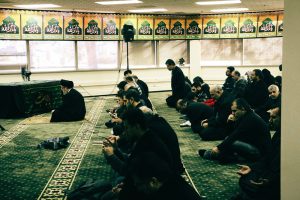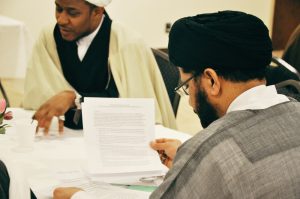Religious Services
Home » Religious Services
As part of its five core functions, I.M.A.M. offers religious services in the following areas. These services are in addition to religious prayer and commemoration services that are held throughout the year.
- Seeking religious edicts for new issues facing the North American community
- Answering individuals’ and communities’ jurisprudence questions
- Performing divorce by religious authority when other solutions have been exhausted
Religious Services – Online Resources:
Religious Services – An Overview
Religious Commemoration & Congregational Prayer Services
This function supports our community in North America in their pursuit of a vibrant and meaningful personal and social life, by facilitating Islamic practice. Whenever a Scholar is needed to conduct prayer or commemoration services on special occasions such as Eid, or serve as a substitute for when a local resident scholar is away, I.M.A.M. facilitates these services by connecting local centers to a national network of scholars. Visit our religious commemoration and or congregational prayer page to request services.
Jurisprudence Questions
Have a question on Islamic Practical Laws (jurisprudence questions)? I.M.A.M.’s team of knowledgeable scholars are here to help and are authorized to answer your questions based on the rulings of the religious authority. With new questions being added regularly to our growing database, we could have an existing answer to your religious question on our get answers page. If you are not able to find an answer to your question, you can submit a new question as well!
Letters to Communicate Religious Practice
There are various social circumstances, which may require a formal letter explaining our religious practices that either allow or prohibit certain activities, that occur at work, school, or university. In these cases, these letters provided by I.M.A.M. are intended to assist the community in circumstances where intercession from the Religious Authority may become helpful. These letters of communication are available in our online resources section above, and may be accessed anytime!
Religious Counseling Services
Our scholars and staff are available for religious counseling services, either in informal conversations or in more formal sessions, regarding all personal, spiritual, khums, and social concerns. All conversations would be based on the highest degree of integrity and confidentiality.
Marriage & Family Counseling Services
I.M.A.M. has been offering marriage counseling services nationwide, locally and internationally, for interested or struggling couples. Many individuals and local resident scholars throughout the U.S. and Canada contact I.M.A.M. to receive help with their specific situations. Often times, these cases involve miscommunication, lack of understanding of each individual’s role, and, sadly, even abuse. In most cases reconciliation between couples is reached. Aside from marriage counseling, I.M.A.M. also offers counseling for families. A strong family is an integral part of a person’s life and I.M.A.M.’s scholars are here to provide strong moral support to families in need of spiritual guidance.
Islamic Marriage Forms
For those seeking to become married according to Islamic law, I.M.A.M. is pleased to be able to provide resources to apply for Islamic Marriage and official Marriage Contracts. The terms of these resources were formulated according to Islamic law by the Council of Shia Muslim Scholars of North America and are available in Arabic and the English language.
Islamic Divorce Forms
In most cases reconciliation between couples is achievable when it comes to partners seeking separation. However, in some unfortunate cases, I.M.A.M. has had to carry out the Islamic divorce process, where cases are processed through a Divorce Committee which is authorized to conduct a divorce based on authority of the Jurist.
Islamic Will – Form
If one of you facing death can leave a legacy, he should bequeath it to his parents and relatives, according to the law. This is the duty of the pious. [The Holy Quran, 2:180]
Having one’s affairs in order is a religious responsibility and brings peace of mind to the testator and their family. Making a will is a commendable act (mustahab) and is widely believed to prolong life. Conversely, leaving out the making of a will is detestable (makrouh) and not a good practice. Death is something we must all plan for as it is an inevitable part of life.
In 2010, the Council of Shia Muslim Scholars of North America issued a concise form to be used by believers in preparing their will, particularly in matters of Islamic responsibilities (i.e. kaffarah, fasting, and so forth).








